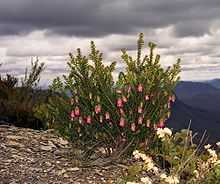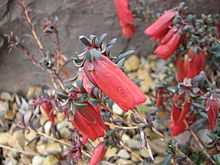Darwinia (plant)
| Darwinia | |
|---|---|
 | |
| Darwinia leiostyla | |
| Scientific classification | |
| Kingdom: | Plantae |
| (unranked): | Angiosperms |
| (unranked): | Eudicots |
| (unranked): | Rosids |
| Order: | Myrtales |
| Family: | Myrtaceae |
| Tribe: | Chamelaucieae |
| Genus: | Darwinia Rudge |
| Species | |
|
See text. | |

Darwinia (syn. Genetyllis DC.) is a genus of about 70 species of evergreen shrubs in the family Myrtaceae, endemic to southeastern and southwestern Australia.[2] The majority are native to southern Western Australia, but a few species occur in South Australia, New South Wales and Victoria. The genus was named in honour of Erasmus Darwin, grandfather of Charles Darwin. They are commonly known as Mountain Bells or simply Bells.

The species of Darwinia grow to between 20–300 cm high, with many of the smaller species being prostrate. The leaves are opposite in decussate pairs (alternate in some species), simple, small, needle-like to oval, 4–20 mm long and 2–10 mm broad, mostly hard with a leathery texture. The flowers are grouped singly or several together, perfect, 2–30 mm long, with five red, white or greenish petals and ten stamens.
They are difficult to propagate from seed but can be cultivated from cuttings.
Many species in the genus Darwinia are threatened with extinction, being listed as Endangered or Vulnerable on the Australian National List of Threatened Flora. Land clearing and grazing practices have reduced the areas where Darwinia species grow naturally. Recovery is hindered by drought, changed fire regimes and susceptibility to infection by the oomycete Phytophthora cinnamomi which kills the plants.
Natural hybrids are known among darwinias, for example between D. fascicularis and D. glaucophylla where these species occur together.
The species Verticordia verticordina was placed in this genus by George Bentham, but transferred to the current arrangement in 1991.[3]
List of species

- Darwinia acerosa – Fine-leaved Darwinia (endangered)
- Darwinia apiculata – Scarp Darwinia (endangered)
- Darwinia biflora (vulnerable)
- Darwinia briggsiae
- Darwinia camptostylis
- Darwinia carnea – Mogumber Bell (endangered)
- Darwinia chapmaniana Keighery (syn.Darwinia sp. Coorow) – Chapman's Bell or Eganu Bell[2] (endangered)
- Darwinia citriodora – Lemon-scented Darwinia
- Darwinia collina – Yellow Mountain Bell (endangered)
- Darwinia diosmoides
- Darwinia diminuta
- Darwinia fascicularis
- Darwinia ferricola Keighery (syn. Darwinia sp. Scott River) – Scott River Darwinia[2] (endangered)
- Darwinia foetida Keighery (syn.Darwinia sp. Muchea) – Muchea Bell[2]
- Darwinia glaucophylla (vulnerable)
- Darwinia grandiflora
- Darwinia homoranthoides
- Darwinia hypericifolia
- Darwinia leiostyla
- Darwinia leptantha
- Darwinia macrostegia (vulnerable) – Mondurup Bell
- Darwinia masonii – Mason's Darwinia (vulnerable)
- Darwinia meeboldii – Cranbrook Bell (vulnerable)
- Darwinia micropetala – Small Darwinia
- Darwinia neildiana – Fringed Bell
- Darwinia nubigena Keighery (syn.Darwinia sp. Stirling Range, Darwinia sp. Mt Success) – Success Bell[2] (vulnerable)
- Darwinia oldfieldii -
- Darwinia oxylepis – Gillam's Bell (endangered)
- Darwinia peduncularis (vulnerable)
- Darwinia polychroma Keighery (syn.Darwinia sp. Carnamah) – Harlequin Bell[2] (endangered)
- Darwinia procera
- Darwinia purpurea – Rose Darwinia
- Darwinia squarrosa – Pink Mountain Bell (vulnerable)
- Darwinia taxifolia
- Darwinia thymoides
- Darwinia vestita – Pom-pom Darwinia
- Darwinia virescens – Murchison Darwinia
- Darwinia whicherensis Keighery (syn. Darwinia sp. Williamson) – Abba Bell[2] (endangered)
- Darwinia wittweror (endangered)
References
- ↑ Darwinia oldfieldii FloraBase
- ↑ 2.0 2.1 2.2 2.3 2.4 2.5 2.6 Keighery, G.J. (2009). "Six new and rare species of Darwinia (Myrtaceae) from Western Australia". Nuytsia 19 (1): 37–52. Retrieved 2009-07-24.
- ↑ "Verticordia verticordina (F.Muell.) A.S.George". Australian Plant Name Index (APNI), IBIS database. Centre for Plant Biodiversity Research, Australian Government.
External links
| Wikimedia Commons has media related to Darwinia. |
- FloraBase - Flora of Western Australia: Darwinia
- Australian National List of Threatened Flora
- Phillimore, R, Evans, R and Brown, A. 2001. The Interim Recovery Plan Gillham's Bell (Darwinia oxylepis) 2001-2003
- Australian Plants Online - Darwinia and related genera
